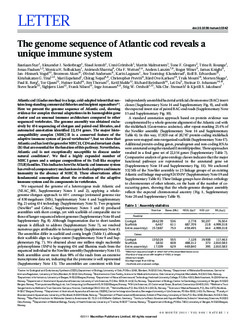The genome sequence of Atlantic cod reveals a unique immune system
Star, Bastiaan; Nederbragt, Alexander J.; Jentoft, Sissel; Grimholt, Unni; Malmstrøm, Martin; Gregers, Tone F.; Rounge, Trine B.; Paulsen, Jonas; Solbakken, Monica H.; Sharma, Animesh; Wetten, Ola F.; Lanzén, Anders; Winer, Roger; Knight, James; Vogel, Jan-Hinnerk; Aken, Bronwen; Andersen, Øivind; Lagesen, Karin; Tooming-Klunderud, Ave; Edvardsen, Rolf B.; Tina, Kirubakaran G.; Espelund, Mari; Nepal, Chirag; Previti, Christopher; Karlsen, Bård Ove; Moum, Truls; Skage, Morten; Berg, Paul R.; Gjøen, Tor; Kuhl, Heiner; Thorsen, Jim; Malde, Ketil; Reinhardt, Richard; Du, Lei; Johansen, Steinar D.; Searle, Steve; Lien, Sigbjørn; Nilsen, Frank; Jonassen, Inge; Omholt, Stig W.; Stenseth, Nils Christian; Jakobsen, Kjetill S.
Journal article, Peer reviewed
Permanent lenke
http://hdl.handle.net/11250/117170Utgivelsesdato
2011-08-10Metadata
Vis full innførselSamlinger
Originalversjon
10.1038/nature10342Sammendrag
Atlantic cod (Gadus morhua) is a large, cold-adapted teleost that sustains long-standing commercial fisheries and incipient aquaculture. Here we present the genome sequence of Atlantic cod, showing evidence for complex thermal adaptations in its haemoglobin gene cluster and an unusual immune architecture compared to other sequenced vertebrates. The genome assembly was obtained exclusively by 454 sequencing of shotgun and paired-end libraries, and automated annotation identified 22,154 genes. The major histocompatibility complex (MHC) II is a conserved feature of the adaptive immune system of jawed vertebrates, but we show that Atlantic cod has lost the genes for MHC II, CD4 and invariant chain (Ii) that are essential for the function of this pathway. Nevertheless, Atlantic cod is not exceptionally susceptible to disease under natural conditions. We find a highly expanded number of MHC I genes and a unique composition of its Toll-like receptor (TLR) families. This indicates how the Atlantic cod immune system has evolved compensatory mechanisms in both adaptive and innate immunity in the absence of MHC II. These observations affect fundamental assumptions about the evolution of the adaptive immune system and its components in vertebrates.
